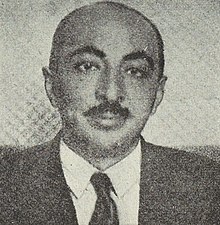Ibrahim Nagi
This article needs additional citations for verification. (February 2022) |
Ibrahim Nagi | |
|---|---|
 Ibrahim Nagi | |
| Born | December 31, 1898 Cairo, Egypt |
| Died | March 27, 1953 (aged 54) Cairo, Egypt |
| Occupation | Poet, Medical Doctor |
| Language | Arabic |
| Nationality | Egyptian |
| Literary movement | Neo-romanticism, "Apollo Sociaty" |
Ibrahim Nagi (Arabic: إبراهیم ناجي) (December 31, 1898 – March 27, 1953) was an Egyptian polymath; a poet, author, translator, and practicing medical doctor. He was among the contributors of Al Siyasa, newspaper of the Liberal Constitutional Party.[1]
Early life
[edit]Nagi was also a doctor in internal medicine. Nagi's most famous poem is Al-Atlal or The Ruins which was eventually sung by Egyptian singer Om Kalthoom. He was a co-founder of the Cairo "Apollo Society" for Romantic Poetry. He married Samia Sami and had three daughters: Amira (who had a daughter, Samia Mehrez, and a son, Mohammed), Dawheya (who went to live in America and had a son- Ahmad, and a daughter- Shahira), and Mohassen.
Bibliography
[edit]- Behind the Fog, 1934.
- In the Temple of the Night, 1948.
- Cairene Nights, 1951.
- The Bird Wounded, 1953.
The legacy of Ibrahim Nagi in the literary studies
[edit]The poetry of Ibrahim Nagi is an object of studies of several literary critics. Nagi's legacy was noted by Abdul Rahman Ghazi al Gosaibi, Hasan Tawfiq and Saleh Jawdat.
References
[edit]- ^ Arthur Goldschmidt Jr. (2013). Historical Dictionary of Egypt (4th ed.). Lanham, MD: Scarecrow Press. p. 388. ISBN 978-0-8108-8025-2.
External links
[edit]
